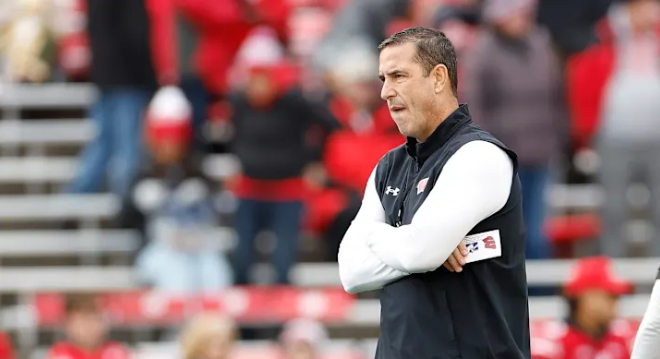The burden on Luke Fickell has become less apparent compared to late last year.
Fickell visibly bears the effects of his University of Wisconsin football team’s losses and challenges, especially in the aftermath of defeats. The 2024 season concluded with five straight losses, breaking a two-decade streak of at least .500 records and bowl games for the Badgers. Following a 24-7 loss to Minnesota on Black Friday, which marked the end of his team’s season, Fickell seemed battered and exhausted at the press conference.
On Wednesday, Fickell discussed, with somewhat less raw emotion, how he has navigated what he considers the toughest two-year period of his coaching career. During his time at Wisconsin, where the Badgers have a record of 13-13 under his guidance, he has realized a crucial distinction: losing is different from simply not winning.
Fickell stated, “When you lose, it’s common to quit, make excuses, or point fingers. A lot comes with losing. But sometimes, you simply don’t win. Unfortunately, this past year, we lost a lot. As you start to evaluate it, especially when you experience more losses than you have before, the difference becomes clearer. There’s growth to be found in not winning, and it’s vital to use that to improve. In the case of losing, many internal issues arise that need acknowledgment and understanding.”
He admitted that he may not have fully grasped these concepts earlier and suggested that the players were in a similar position. “If it was a loss, it was a loss, and you just moved on. But there’s a clear difference. I hope we can be honest about it as a program and use that understanding for growth. It’s not about dwelling on negativity, but recognizing and understanding the distinction between losing and simply not winning.”
Experiencing 13 losses over two seasons was foreign to Fickell, as he had only lost 11 times combined during his last five seasons at Cincinnati, which included a New Year’s Six bowl and a College Football Playoff appearance. During his final six years at Ohio State, he saw just 13 losses, many of which were during his interim season, but the team reached four New Year’s Six bowls and participated in the first College Football Playoff championship.
As a fiercely competitive individual, Fickell finds it challenging to move past setbacks. His strength and conditioning director, Brady Collins, who followed him from Cincinnati, acts as an important support figure.
After one of the season’s low points—a 42-10 rout by Iowa—Fickell appeared visibly upset, reflecting on the loss while standing beside Collins who was helping him process the moment.
Collins commented, “Fickell is used to winning, as we all are, but winning is hard and teaching that to kids can be challenging. It’s important to learn from our experiences. Though we’ve faced close calls, true growth comes when we finally capitalize on those moments. What we’ve gone through doesn’t define us; it prepares us for better outcomes in the future.”
Fickell noted that his close circle for support is shrinking. “Brady has always been a reliable source of support. We’ve been together for a long time, and he’s naturally optimistic. But it’s tough. When you go home, you try to regain your composure because you need to show strength the next day, and that can be exhausting.”
He has sought guidance from Wisconsin wrestling coaches such as Chris Bono and Jon Reader as well. Players have consistently expressed appreciation for Fickell’s emotional investment following losses. Tawee Walker, the previous season’s leading running back, said he values Fickell’s deep involvement. Senior cornerback Ricardo Hallman underscored the importance of mutual accountability between the players and Fickell, acknowledging that recognizing past struggles is key to moving forward.
Fickell has addressed two critical issues this offseason that he believes have hindered the Badgers. First, he revamped the team’s offensive strategy by dismissing coordinator Phil Longo with two games left in the season and hiring Jeff Grimes, who emphasizes physicality—an approach that aligns better with Fickell’s vision for the program. Additionally, the coaching staff has worked to reshape the roster, particularly on the defensive line, to improve the team’s subpar run defense.
“There’s a need for a reset, and I recognize that we didn’t handle some things well enough systematically; that responsibility lies with me,” Fickell said. “Being locked into a specific system can sometimes limit flexibility for improvement.”
There is significant pressure on Fickell to ensure his recent changes yield positive results, as opportunities for overhaul are rare, even at a program like Wisconsin, which is traditionally slower to dismiss coaches.
Despite speculation and rankings suggesting he is on the coaching hot seat, Fickell remains focused on implementing the changes necessary to prevent the heavy losses that have weighed on him recently.
